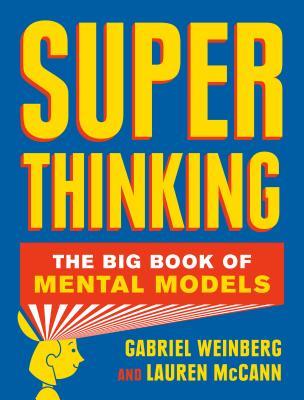Review: Lauren McCann and Gabriel Weinberg’s “Super Thinking”
by Miles Raymer
Before starting it, I had misgivings about whether Lauren McCann and Gabriel Weinberg’s Super Thinking would be worthwhile for me to read. This was mainly because I have already studied a lot of mental models from various fields of research, and also because it seemed a bit too self-helpy for my taste. But my best friend bought me a copy, so I took it up in order to discuss with him.
To its credit, Super Thinking is probably the most comprehensive and up-to-date collection of mental models––”recurring concepts that help us explain, predict, or approach…seemingly disparate subjects” available to modern readers (vii). McCann and Weinberg’s goal is to highlight a variety of “broadly useful” (or “super”) models that serve as mental tools for successfully understanding and navigating the many challenges of life (viii). They claim that the proper application of these models will result in “the ability to think better about the world––which you can use to your advantage to make better decisions, both personally and professionally (viii, emphasis theirs).
The book is clever and well-written, with lots of images, funny comics and unintimidating graphs that provide multiple pathways to content comprehension. Its strongest feature is the sheer number of mental models on offer, and how McCann and Weinberg weave them together in a series of thematic chapters. Although many of the models share overlapping concepts and sometimes feel a bit redundant, the conceptual synthesis on display here is impressive.
I enjoyed the first half of this book much more than the second half. This is because Super Thinking starts out by focusing on how mental models can improve our personal decision-making, whereas it ends with an examination of how they can improve our performance in professional life. I especially enjoyed the first four chapters, which explain how to be “less wrong” in general, how to avoid and effectively deal with unintended consequences, how to spend your time wisely, and how understanding the laws of nature can help us become more realistic, resilient and adaptable.
There were several mental models that were new to me or that I enjoyed revisiting since I’m bad at following them. These include:
- Overfitting (the opposite of Ockham’s razor): “When you use an overly complicated explanation when a simpler one will do” (10).
- Anchoring: “Your tendency to rely too heavily on first impressions when making decisions” (14).
- Optimistic Probability Bias: When you “want something to be true so badly that you fool yourself into thinking it is likely to be true” (33).
- Luck Surface Area: “Your personal luck surface area will increase as you interact with more people in more diverse situations…You need to relax your rules for how you engage with the world” (122).
My enjoyment of Super Thinking took a hit as the book became more and more preoccupied with professional achievement. The latter chapters, which have titles like “Unlocking People’s Potential” and “Flexing Your Market Power,” reveal an unacknowledged mental model that dominates McCann and Weinberg’s approach: Modern America’s hyper-capitalized way of defining “success” through market mechanisms, material gain and labor competition. For example:
When you are undifferentiated––with no sustainable competitive advantage and therefore no market power––you are completely subject to the supply-and-demand forces in the market, and the price they deliver to you. That speaks to picking an industry in high demand for the long term…It also speaks to the need to differentiate yourself from your peers by developing a unique set of skills that the market values. Then you have the opportunity to demand higher compensation by demonstrating the distinctive value you bring to your employers or clients. (284)
To be clear: I don’t think McCann and Weinberg are wrong about the importance and function of differentiation in the modern labor market. Further, I think their business-related discussions throughout the book are both shrewd and well-intentioned.
The problem is that I have an intellectual aversion to this way of writing and thinking about human beings and the act of living. If mental models really are as powerful and profound as McCann and Weinberg claim (which I believe they are), shouldn’t they serve a higher purpose than merely allowing us to better conform to the strictures of our unfair and arguably broken economic system? Shouldn’t they teach us how to build better families and friendships, better communities and better civic identities? Shouldn’t they unlock our potential to become more compassionate and less judgmental of others, as well as appropriately critical and mobilized in the face of injustice?
Even in the earlier chapters, McCann and Weinberg demonstrate relatively little concern with these humanist goals. Instead, they content themselves with using the best ideas humans have created after millennia of trial and error and centuries of scientific inquiry to help business executives leverage “10x teams” and “activate force fields” that will generate a “sustainable competitive advantage” (248, 302). This disparity between gravity of subject matter and frivolousness of application is alarming, and renders Super Thinking a much less valuable text than it could have been.
Rating: 5/10
